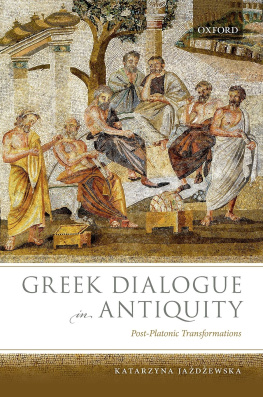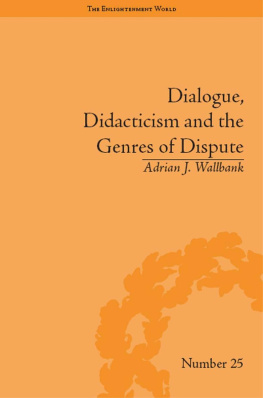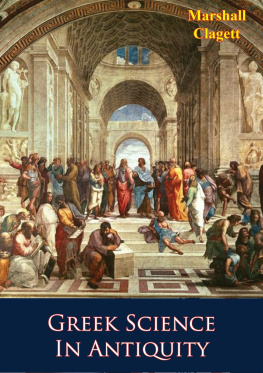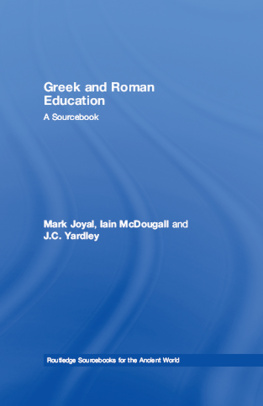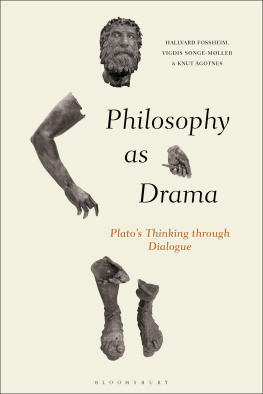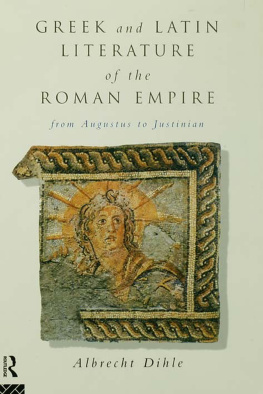This book was written with support from several institutions. The research was financed by the Polish National Science Center (Sonata grant 2015/17/D/HS2/01438), which allowed me to spend many summer weeks in the Institute of Classical Studies Library in London. I greatly thank the staff of the library, and especially Sue Willets, for their help and hospitality over the years. Since August 2020 I have received funding from the European Union?s Horizon 2020 research and innovation programme under the Marie Sk?odowska-Curie grant agreement No 754513 and The Aarhus University Research Foundation. The project was also generously supported by the Alexander von Humboldt Foundation, whose Fellowship for Experienced Researchers permitted me to spend ten productive months in the libraries of Katholische Universitt Eichsttt-Ingolstadt. I heartfully thank my Eichsttt host and friend Gernot Mller for his enthusiasm for my project and many stimulating discussions. I am also grateful to Anna Ginest Rosell and Johannes Sedlmeyr, my Eichsttt colleagues, for our conversations on the dialogues of Plutarch and Cicero. Special thanks are due to Sandrine Dubel, Anne-Marie Favreau-Linder, and Jean-Pierre de Giorgio of the Centre de Recherches sur les Littratures et la Sociopotique at Universit Blaise-Pascal Clermont-Ferrand, who invited me to participate in lively workshops and conferences on the ancient dialogue, and to Krystyna Bartol for providing me with the opportunity to present my research before the Committee on Ancient Culture of the Polish Academy of Sciences.
I am most grateful to Christopher van den Berg, Jan Kwapisz, and Geert Roskam for reading parts of the manuscript and providing me with constructive criticism. I am indebted to the anonymous readers of Oxford University Press, whose careful reading and valuable comments helped to improve the manuscript. I owe very special thanks to Krystyna Stebnicka, whose friendship, advice, and encouragement meant a great deal to me during this lengthy journey. To my family team, Krystian, Robert, and Maja, I owe more than I can acknowledge: thank you for cheering me on and for being curious, and for enduring books and papers spilling over tables and sofas.
The list contains abbreviations of editions of fragments, databases, and translations referred to by the translators name. If no translator is named (either below the translated text or in an accompanying footnote), the translation is my own.
For references to ancient texts, I have mostly used the abbreviations of the Oxford Classical Dictionary (4th ed.) or A Greek-English Lexicon by H. G. Liddell, R. Scott, and H. S. Jones (9th ed.). The abbreviations of journal titles follow LAnne philologique.
G. Arrighetti, Epicuro. Opere. Nuova edizione riveduta e ampliata. Turin 19732 [1960].
I. Worthington (ed.), Brills New Jacoby. Brills online reference.
Corpus medicorum Graecorum. Berlin 1908.
V. Cousin, Procli philosophi Platonici opera inedita. Paris 1864.
A. H. Coxon, The Fragments of Parmenides. A Critical Text with Introduction and Translation, the Ancient Testimonia and a Commentary. Revised and Expanded Edition with New Translation by R. McKirahan and a New Preface by M. Schofield. Las Vegas and Zurich 2009.
E. Diehl, Procli Diadochi in Platonis Timaeum commentaria. Vols. 13. Leipzig 19036.
K. Dring, Die Megariker. Kommentierte Sammlung der Testimonien. Amsterdam 1972.
I. Dring, Aristotles Protrepticus. An Attempt at Reconstruction. Gteborg 1961.
P. P. Fuentes Gonzlez, Les diatribes de Tls. Paris 1998.
A. S. F. Gow, Machon. The Fragments. Edited with an Introduction and Commentary. Cambridge 1965.
M. Isnardi Parente, SenocrateErmodoro. Frammenti. Naples 1982.
R. Kassel and C. Austin, Poetae comici Graeci. Berlin and New York 1986.
J. F. Kindstrand, Bion of Borysthenes. A Collection of the Fragments with Introduction and Commentary. Uppsala 1976.
A. Krte, Metrodori Epicurei fragmenta. Leipzig 1890.
G. Kroll, Procli Diadochi In Platonis Rem Publicam commentarii. Vols. 12. Leipzig 18991901.
C. G. Khn, Claudii Galeni opera omnia. Vol. 4. Leipzig 1822.
R. Merkelbach and M. L. West, Fragmenta Hesiodea. Oxford 1967.
H. J. Mette, Zwei Akademiker heute: Krantor von Soloi und Arkesilaos von Pitane. Lustrum 26 (1984): 794.
.
S. D. Olson and A. Sens, Archestratos of Gela. Greek Culture and Cuisine in the Fourth Century BCE. Oxford 2000.
V. Rose, Aristotelis qui ferebantur librorum fragmenta. Leipzig 18863.
S. Schorn, Satyros aus Kallatis. Sammlung der Fragmente mit Kommentar. Basel 2004.
E. Schtrumpf, Heraclides of Pontus: Texts and Translation. New Brunswick 2008.
H. Lloyd-Jones and P. J. Parsons, Supplementum Hellenisticum. Berlin and New York 1983.
W. D. Smith, Hippocrates. Pseudepigraphic Writings. Letters. Embassy. Speech from the Altar. Decree. Leiden 1990.
M. F. Smith, The Epicurean Inscription. Naples 1993.
G. Giannantoni, Socratis et Socraticorum Reliquiae. Vols. 14. Naples 1990.
S. Sudhaus, Philodemi Volumina Rhetorica. Vol. 2. Leipzig 1896.
H. von Arnim, Stoicorum veterum fragmenta. Vols. 14. Leipzig 190324.
L. Tarn, Speusippus of Athens. A Critical Study with a Collection of the Related Texts and Commentary. Leiden 1981.
B. Snell, R. Kannicht, and S. Radt, Tragicorum Graecorum fragmenta. Vols. 15. Gttingen, 19712004.

